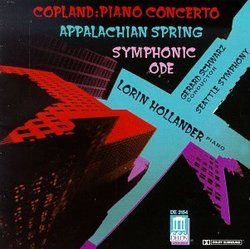| All Artists: Copland, Hollander, Schwarz, Seattle Symphony Title: Piano Concerto Members Wishing: 0 Total Copies: 0 Label: Delos Records Release Date: 9/19/1995 Genre: Classical Styles: Opera & Classical Vocal, Ballets & Dances, Ballets, Forms & Genres, Concertos, Historical Periods, Modern, 20th, & 21st Century, Instruments, Keyboard Number of Discs: 1 SwapaCD Credits: 1 UPC: 013491315423 |
Search - Copland, Hollander, Schwarz :: Piano Concerto
 | Copland, Hollander, Schwarz Piano Concerto Genre: Classical
|
Larger Image |
CD Details |
CD ReviewsThree by Copland--an Interesting Mix M. C. Passarella | Lawrenceville, GA | 07/27/2005 (5 out of 5 stars) "Here are two of Copland's early and to some extent experimental works together with a certified classic, maybe his finest piece. The Piano Concerto, premiered in 1928, is the last of Copland's purely jazz-influenced works. Like the earlier Organ Symphony, it created quite a stink when it was premiered in Boston. To a critic--let alone a mere music lover--of the 1920s, it must have seemed outrageously forward-looking with its polyrhythms and dissonances, its brash orchestration and pop-musical roots. In fact, the critic Philip Hale wrote that the concerto "shows a shocking lack of taste, proportion." Actually, it's hard to argue with Hale on this score: the concerto isn't a very good work, and as far as the use of jazz is concerned, it's far less attractively done than in Gershwin's popular Piano Concerto in F of a couple years earlier. Ditto if you're looking for a truly sophisticated integration of jazz and classical music: Ravel's two concertos, written just a year or two later, make Copland's sound absolutely scrappy if not downright trashy. Sorry, that's just the case. Hollander and Schwarz do their level best by the concerto, but they can't redeem it from mediocrity.
On the other hand, Copland himself thought highly of his little-known Symphonic Ode, written for the Boston Symphony and premiered in 1932, and he's right in his appreciation that this work represented a breakthrough for him. True, there is a lot of empty passagework here, a lot of places where the orchestra just skitters up and down the scale, but there is also that same wide-open-spaces sound that would establish itself as typically American in the wake of pieces like "Billy the Kid" and "Rodeo." Here, too, is what Copland himself identified as a certain "spirit." This spirit would later translate into the little-man-as-hero populism of works such as the Third Symphony, "John Henry," and "A Lincoln Portrait." And the ending of the piece is pretty exciting in the frenzied manner of "El Salon Mexico." The Symphonic Ode is not great Copland, but it's pretty good Copland. Then of course there is "Appalachian Spring," maybe the greatest of great Copland. Schwarz and his orchestra give a fine performance with good basic tempos and careful regard for Copland's lovely, subtle sense of orchestral color. No use comparing this performance to classics from the likes of Bernstein, Thomas, or Copland himself; if it isn't quite a classic, it's a very, very decent job nonetheless. Throw in a highly effective performance of the Ode, and you have a recording that should satisfy Copland fans who want to hear their composer at his best, as well as explore a bit. Big, bright, impactive sound seals the deal for me." |

 Track Listings (4) - Disc #1
Track Listings (4) - Disc #1